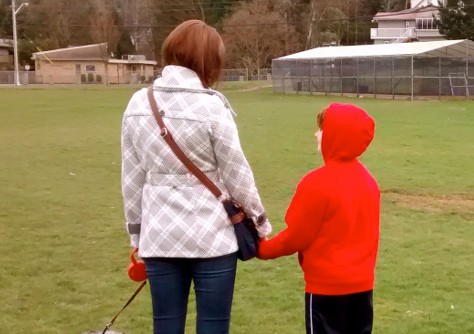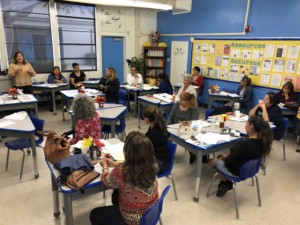I Am “That” Parent

Karen Copeland
I am that parent.
Dear professionals: You know me, I am the one who asks questions. The one who will turn a 15 minute scheduled meeting into 45 minutes. The one who does not hesitate to let you know when things are not going well for her child. The one who can get emotional and (unintentionally) make everyone feel yucky. The one who requests documentation and wants to look at her child’s file. The one who says she wants goals to be more specific. The one who just doesn’t seem to go away and leave you alone to do your job.
Dear other parents: You know me, I am the one who always looks a bit off in the morning. The one who used to plead with her child to enter the school. The one who stands off to the side and appears to be waiting for something to happen. The one who can’t seem to get her child to behave like all the other kids. The one who doesn’t parent her child the way you do.
I would love to tell you how I wasn’t always that parent.
I would love to tell you about how when our child first started school I trusted and believed that he would be okay, even though we knew he was just a little bit different than the other kids.
I would love to tell you how many times we were told to just leave things up to the school staff and our son would be fine.
I would love to tell you about the time when I became concerned about things that were happening for our son, concerned enough to book an appointment with a pediatrician. I would love to tell you that he saw us for fifteen minutes, made a snap diagnosis and told me to put our son on medication.
I would love to tell you about the time we saw a counselor for one hour, who told us our son had a different diagnosis and we needed to find him a special school.
I would love to tell you about the looks of confusion, pity and sometimes even derision that have been cast my way on the playground. I would love to tell you about the times that I stood alone outside the school waiting for my son, with no one approaching me.
I would love to tell you about the time I had to console my son because he finally realized that everyone else in his class was getting invited to birthday parties, except for him.
I would love to tell you about the time that I provided a teacher with a letter that highlighted my sons strengths, challenges and how to best approach these, only to be told “I prefer to find things out for myself”.
I would love to tell you about the time my son sat in the hallway all day because he refused to complete a writing assignment at the beginning of the day, even though his Individual Education Plan clearly stated he was to be presented with a distracting activity when he gets stuck.
I would love to tell you about trying to figure out what services might be available to support our child and our family. I would love to tell you about finding out about a certain resource, and feeling hopeful only to placed on a waitlist for at least six months. I would love to tell you about the times we have been referred to a service only to be told we don’t meet their mandate.
I would love to tell you about how I became detached from any and all school activity because it did not matter what I said or did, it impacted my son and likely gave me an ulcer. I didn’t want to become known as that parent.
I would love to tell you about the time a psychiatrist saw us for 15 minutes and determined our son should no longer qualify for a public assessment, and then followed up with a letter saying we had provided non-specific information to support our concerns, because apparently ten pages of documented observations are considered to be non-specific.
I would love to tell you about the time that my son was in desperate need of connection to a medical professional. I would love to tell you about the ways we were handed off from one service system to another, no one wanting to provide the support that had been recommended.
I would love to tell you about sitting in meetings and hearing about all the bad things our son was doing. I would love to tell you about all the times we have been made to feel that our parenting was the reason our son was the way he was. I would love to tell you about the time I was a “fly on the wall” and overheard some brutal comments about my child.
I would love to tell you about all the times we were told our son simply couldn’t handle a full day of school and that we needed to pick him up early. I would love to tell you that this meant I needed to give up my employment because I was unable to fulfill my obligations. I would love to tell you that even though we did this, we did not receive any support from any organization for the time our son should have been in school.
I would love to tell you about how year after year, we have to explain our son to new people because it seems like the information does not go forward to the next grade in a timely way.
I would love to tell you about how some mornings when I am walking my dog, I reflect on all of this and realize how easy it is to isolate myself from this world that sometimes does not understand.
But most of all, I would love to tell you that I am proud of my son and his courage in facing each day.
I would love to tell you that even though I started out not really knowing how to advocate for my son and his learning needs, I persisted. I took the time to figure out how my son learns, and discovered his strengths and gifts. I would love to tell you that even though my son learns differently, this is not something to be ashamed of, it is something to celebrate because it challenges me to think in new, and often better ways.
I would love to tell you how we figured out that creating positive connections with supportive adults has made an incredible difference in our son’s confidence. Those trusting relationships gave my son the chance to discover that other adults believe in him too. That he is good enough.
I would love to tell you how I am proud of myself for becoming more knowledgeable about the challenges my child faces, learning about the systems we access for support, learning the jargon so I don’t feel dumb sitting at the meeting table when an acronym is used.
I would love to tell you about the people who have come into our lives on our journey who have believed in us and given us hope. I would love to tell you about the one time we were asked the question “where would you like to see your child when he is an adult, and what can we do to help get him there?” I would love to tell you about the time I broke down in tears in a meeting, because my child’s sixth grade teacher said she loved having him in her class, that he was polite and respectful. I would love to tell you that was the first time anyone had ever said that to us in a meeting.
I would love to tell you that I don’t want to be that parent but then I would not be telling you the truth. I am thankful I am that parent. I would love to tell you I am glad to have discovered my voice, that I have become aware of my rights as a parent in these systems, and I am not afraid to let this be known. I would love to tell you that despite all the challenges we have experienced, I continue to have faith and hope for my family, I believe we will be okay. I would love to tell you that I would much rather be that parent, than staying silent and letting things happen as they may.
If you happen to decide you would like to listen, I would love to tell you our story.
This blog is part of our Smart Parents Series in partnership with the Nellie Mae Education Foundation. For more information about the project see Parents, Tell Your Story: How You Empower Student Learning as well as other blogs:
- Everything is Different Now: Parenting for Powerful Learning
- Growth Mindset Parenting
- The Power of Personal Relationship in Personalized Learning

Karen Copeland is the parent of two children and lives in Abbotsford, British Columbia. Follow her on Twitter @KarenCopeland3.





Karen
Thank you Getting Smart for sharing my article! I hope it will resonate with many of your readers, and perhaps inspire some curiosity and empathy where assumptions and judgments may have been made before. Our son's best learning experiences have come where we have felt valued at the table, included in the conversation, and respected for our journey. The little things, like the teacher who created opportunities for our son to have positive interactions with his peers, instead of simply expecting these to happen. The Administrator who opened her door and welcomed us in, making inquiries for us instead of simply saying "no". The teacher, who understood our son learned differently and allowed him flexibility versus expecting him to learn like every other child in the class. We are very thankful for our champions and the difference they have made in our journey. Thank you again for sharing my post.
Bonnie
Thank you.
RiaH
OMG... This is very similar to "our family's" story too! I can empathize with you! I was in tears reading this because it it home and was so dead on in regards to how those parents that are fierce advocates for their children are so often ostracized and made to be an outcast at the school. It should never get to that point. Unfortunately I have lost all faith in the public school system and back homeschooling if it's doable. Why should we as parents be sending our children to a place that does not do what is needed to help them reach their potential? Why reward them with the funding for having your child attend their school? At least that is where we are currently at in our thinking due to the multiple and repeated negative experiences where we have proven there is a diagnosed skill set deficit and a need for remedial services to close the gaps and to reach grade level proficiency, yet the schools refuse to provide the targeted, remedial instruction, that we have had to obtain outside of the public school system. And we have proven to them that even though they wanted to tell us that we had raised the bar to an unachievable high level for him that he would never obtain with success, he has surpassed levels of what they could never have dreamed of. At 16 yrs old, and had been in Special Ed from P-11th grade, he is currently enrolled in 15 college credits of classes for his second half of his Junior year of high school, and already completed 18 credits of college classes between January of 9th grade through December of 11th grade. So he is on track to complete 33 college credits by May of 11th grade! I don't like to "count the chickens before they are hatched", but he is on track to complete his classes as he has been getting an A, with B's and C's in all of his college classes to date this semester. So please, do whatever is needed to get your child the help as early as possible, even if it means going outside of the school to get it. You will not be sorry if you research the programs being used and talk to other parents who have already walked your path ahead of you!
Replies
Tom Vander Ark
Thanks for sharing your story.
Karen
Thank you for sharing your story, RiaH. It is wonderful to hear success stories and know that the successes are happening because we, as parents, haven't given up on our children. ~Karen